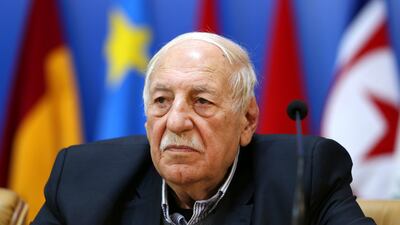Ahmed Jibril, whose Popular Front for the Liberation of Palestine – General Command was one of the main armed groups fighting against Israel in the 1970s and 1980s, died in Damascus on Wednesday. He was 83.
“He has dedicated his life to serving Palestine and the front and stayed the course until his death,” said the PFLP-GC, which is designated as a terrorist group by the US.
Jibril founded the PFLP-GC in 1968 after splitting from the PFLP of Palestinian nationalist leader George Habash.
In its early years, the group carried out dozens of attacks in the Middle East and Europe, including aircraft bombings, kidnappings and letter bombs. Israel's International Institute for Counter-Terrorism said these included the 1970 mid-air bombing of a Swiss airliner that killed all 47 passengers and crew, and a 1972 attempt to blow up an El Al plane using a booby-trapped record player.
It was also one of the first groups to use suicide squads. In 1974, three members attacked the town of Kiryat Shemona in northern Israel, killing 18 hostages before they were killed by Israeli troops. In November 1987 it used motorised hang-gliders to fly two guerrillas across the border from Lebanon, killing six Israeli soldiers.
Jibril was later at odds with the late Palestinian leader Yasser Arafat and his successor Mahmoud Abbas over their peace accords with Israel and the way the Palestine Liberation Organisation was led.
A prisoner swap Jibril negotiated with Israel in 1985 won him fame among Palestinians at the time. The deal led to the release of more than 1,000 prisoners, including long-serving Palestinian detainees, in return for the release of three Israeli soldiers. Among those released was Hamas co-founder Sheikh Ahmed Yassin.
For decades he took the side of Syria's government, and was criticised by some Palestinians for aligning his group with President Bashar Al Assad's forces in the civil war there over the past decade. PFLP-GC fighters fought alongside Syrian troops in battles to retake Yarmouk camp, a district in Damascus that is home to the largest concentration of Palestinians in Syria.
The group, which has close ties to Hezbollah, the Iran-backed group in Lebanon, has a small presence in Lebanon's refugee camps.
Jibril lost his son in a car bomb in Lebanon in 2002. He had relocated to Syria from Lebanon in the early 1990s.

